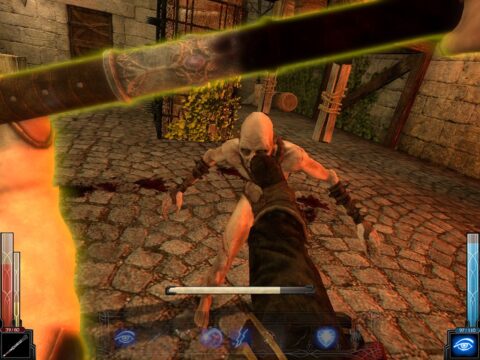
Dark Messiah of Might and Magic
Written by: Rik
Date posted: September 9, 2012
- Genre: RPG
- Developed by: Arkane Studios
- Published by: Ubisoft
- Year released: 2006
- Our score: 6
I’ve mentioned this before, so I won’t labour the point, but my experience with RPGs is rather limited. In fact, it wasn’t until relatively recently I realised I’d been referring to a non-existent game called Planetscape Torment as a genre classic. (On the subject of names, I feared a similar faux-pas with this one: I’ve always included the of, but the game box confusingly omits it, and the internet can’t seem to make up its mind whether it should be there or not. If you know the answer, do write in: you could win a prize). Anyway, I’m rarely seen around this area of the site, leaving things to my colleague, who’s much more adept at these things than I am – he even calls them by the correct name, too.
Whether or not Dark Messiah of Might and Magic (hereafter referred to as Dark Messiah) actually qualifies as an RPG is open to debate: even those charitable to the idea that it does would be hard-pressed to describe it as anything other than ‘action-centric’, and I understand it’s also pretty short-lived as far as these things normally go. On the other hand, though, it’s got stats and skill points, plus magic, orcs and – most importantly – beards, so I reckon we’re in the right place here.
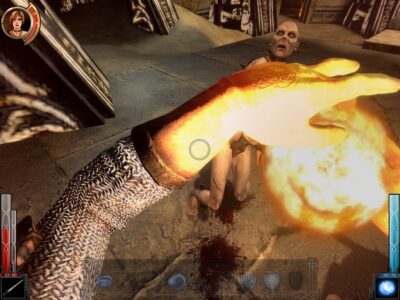
This may look impressive, but I’ve let that thing get too close for me to use this fireball effectively.
Exactly how Dark Messiah fits into the Might and Magic universe, I couldn’t say, but the story, such as it is, puts you in the shoes of Sareth, a wizard’s apprentice. Initially sent on a quest to find a crystal, you’re then sent off in another direction to retrieve something called ‘The Skull of Shadows’. Both are apparently incredibly important to your wizard bosses, who lend you assistance in the form of a spirit guide called Xana and a fellow apprentice, Leanna. If it sounds like I’m skimping on details because this kind of thing isn’t to my taste and I can’t bring myself to validate names like ‘Phenrig’ and ‘Menelag’ by typing them out, then it’s because I am, but only slightly: there’s honestly not an awful lot more to it than that (more on which later).
As you might expect, your quest to obtain these valuable and sought-after artifacts is a lengthy and dangerous one, and success can only be achieved once you’ve overcome an army of foes along the way. That is to say, there’s a hell of a lot of combat in this game. Dark Messiah plays a little like an FPS without the guns, with a heavy emphasis on melee weapons, particularly at the start. Using the traditional mouse/keyboard controls, you can wave a your sharpened metal object of choice around in a variety of ways – quick clicks slash at your enemy, while holding down the mouse button performs a more meaty stab, with a range of powerful and elaborate manoeuvres becoming available later on. As a core mechanic it’s certainly been implemented with more thought and attention than in other games where the melee weapon is little more than a comedy gimmick, and there is considerable, if slightly bloodthirsty, satisfaction to be gleaned from slicing off an enemy’s head (successful attacks build up adrenaline, which allows you to perform swift ‘execution’ moves such as this once the bar reaches the top). Despite the nuances, though, I’d have to say that for each time you feel like you’ve done something on purpose, there are several others where success is achieved via a desperate flurry of clicking and waving the mouse around at random.
Another method of vanquishing your enemies is to use the environment around you. Dark Messiah uses the Source engine most famously employed in Half-Life 2 and, like that game (which, in true FFG tradition, we haven’t covered yet, although we reckon you might have heard of it anyway), you can expect plenty of physics-based capers, most of which involve cutting a rope or a support in order to bring something heavy crashing down on your enemies. Setting fire to things, and enemies, is also encouraged. Most significantly, though, Dark Messiah offers a kicking feature, with a single button press delivering a swift boot to an enemy or object. Frankly, you’ll be using this a lot; it’s handy for defence, but even better for dispensing of an enemy altogether, should they be standing next to a ledge, or a fire, or a nasty-looking set of spikes. And, believe me, enemies will be standing in such dangerous places, and often, with many areas representing a veritable health and safety nightmare. On the plus side, though, there is a refreshing Raiders of the Lost Ark aspect to it all, with significant cowardly joy to be found in booting an orc off the side of a mountain when he’s not looking.
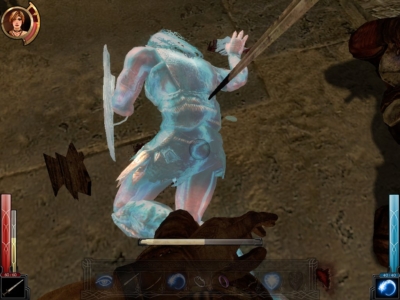
Orcs are given to overuse the word ‘stranger’ when alerted to your presence, with often farcical consequences. This one’ll be no bother though – he’s now a giant ice cube.
Other combat options include, inevitably, magic, with a variety of projectile spells – freeze, lightning, fire, and others – at your disposal. You can also use magic to heal yourself, or for slightly more tricksy manoeuvres such as charm, which causes an enemy creature to fight on your side for a short period of time. A final combat option is archery, which comes in handy if you want to attack enemies from a distance, even if the arrows don’t always seem to have quite as much of an impact on your foes as you might hope – instead of slicing through flesh to fatal effect, it feels more like you’ve shot at them with an air rifle.
This being an RPG, you’re not going to be able to master the sword, bow and the, er, wizard’s robe all at the same time. You acquire skill points as you progress, and invest them in your chosen areas of expertise. Dark Messiah is a fairly linear adventure, though, and by and large you receive skill points for achieving the major objectives necessary to progress through the game: there are one or two optional quests, and they are rewarded, but there’s no opportunity to grind through enemies away from the main quest to up your skill points – it just happens as you go along.
As always, there’s the thorny issue of how best to spend your skill points, prompting the usual agonising for indecisive gamers such as myself. Reluctant to put all of my eggs in one basket, I failed to specialise in any particular area, but I wasn’t punished too badly for it. In fact, it seemed like a viable strategy: melee combat is a massive part of the game, but other sections would be virtually impossible without some magical skills, and though I was dismissive of archery, it came in very handy towards the end of the game. I always find it difficult to commit to something without knowing beforehand how effective it’ll be in a real situation; in that respect, I was grateful for the inclusion of magical scrolls, which allow you to cast spells as a one-off and observe how useful they are before you decide to invest in them as a skill. There are some stealth-based areas to develop, too, but given my track record as a clumsy and nervous oaf when it comes to such things, I didn’t give them too much attention. (I would imagine, though, that a completely stealthy path through the game would prove quite difficult even for a more adept gamer).
There are other stats, here, too, and although they’re largely hidden from view, and you could safely ignore them altogether, paying attention proves worthwhile. Certain weapons and spells work best against certain enemies – humans and animals are vulnerable to fire, orcs and goblins don’t like lightning – and this is particularly important when you come to use melee weapons charged with magical properties (a fire-staff, lightening daggers, and so on). You’re certainly never short of options – by the end, there were weapons in my inventory that I’d ignored altogether (or failed to even notice that I’d picked up), and I hadn’t explored all of the magical options available to me, either. It’s entirely possible that I could have made things easier for myself, but on the other hand, I rather liked the fact that my ignorance wasn’t punished too severely. Still, there are lots of things to try, and that’s clearly A Good Thing.
The bulk of Dark Messiah involves killing things; there’s a little talking, and some getting lost, but it’s otherwise a case of going from place to place and slicing, burning or kicking your enemies to death. Occasionally, you’ll team up with an ally or civilian, and there are some exciting set-pieces and boss battles – fighting a cyclops, protecting a town from a flying dragon, or escaping the attentions of a giant worm – which are genuinely thrilling. Unfortunately this excitement is tempered by the presence of some extremely dull bits, wandering through endless underground dungeons and fighting off spiders. The underground sections seemed to cause me particular difficulty as I found the ‘light’ spell that allows you to see in the dark was rather too bright, giving me a choice of peering into murky light or recoiling at shimmering brightness. A final irritation is the presence of rather too many tedious climbing sections which involve you firing a rope-bow at wooden beams – an acceptable contrivance in smaller doses – and leaping from rope to rope (or not, with failure causing predictable ‘falling to your death’ frustration).
The exciting/dull ratio is skewed rather too far towards the latter for my liking, and the result is that Dark Messiah drags and feels rather drawn-out in too many places. As we mentioned, little attention has been given to the story: plot points come in dribs and drabs and so infrequently that you’re likely to forget what it is you’re doing and why. Then there’s the bizarre decision to include some truly terrible cut-scenes that look worse than the in-game graphics (and in all other respects, this is a very good looking game). While there are spectacular and enjoyable moments here, it all feels like a series of unrelated events, with little sense of anything building to a crescendo or final resolution. We also have to deduct marks for dubious use of, ahem, ‘sexy ladies’ (for more on which, see Sexee Ladees).
We mentioned the length of the game already, and at 14-15 hours it’s certainly not the most time-consuming RPG you’ll ever play. But I would imagine other RPGs give you much more to do, and to invest in, than the endless hacking, slashing and kicking on offer here. Dark Messiah feels a little like an action game that outstays its welcome. I personally have no problem with something that’s done and dusted in a weekend, and had that been the case here, I probably would have enjoyed it a little more, and could maybe have countenanced a second play-through to see if I could approach certain things differently. As it is, you could get still through the entire Lord of the Rings trilogy before you’d get to the end of this game, and that’s not time I’m willing to spare.
Dark Messiah of Might and Magic, then, is intermittently quite enjoyable, a mixed bag of good bits and irritating bits. For me, it was a case of be careful what you wish for – it’s an accessible RPG that plays a bit like an action game, but it lacks the depth of the former and the pace and immediacy of the latter. I’m almost curious to try something more involved than this, but am also equally tempted to leave the genre alone for a while, given the time investment involved. Still, never say never – perhaps I’ll see you here again.

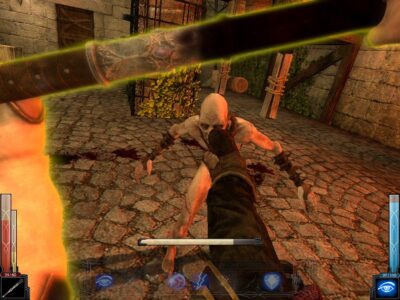
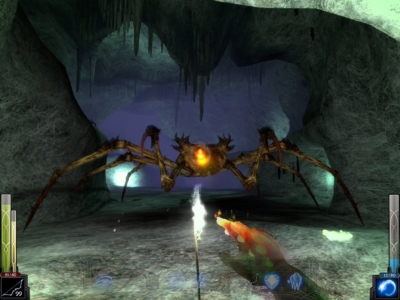

 Posts
Posts
Stumbled on the blog, when searching for more info about the game
Played it recently, and I had a blast, games have certainly devolved in certain aspects…
It’s awesome to see a blog still updated after so many years.
Brings me back to my 2010’s when my teenage self got lost on the internet for the first time
You’re a legend, take care 🙂
February 26, 2025 @ 3:04 pm